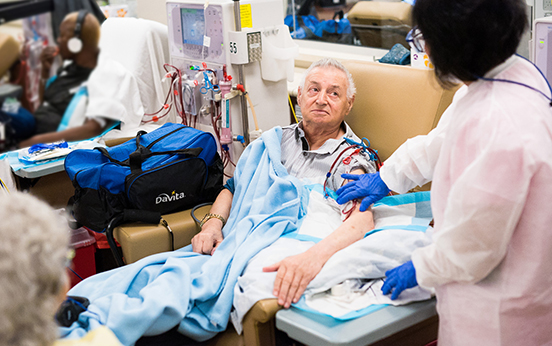- Find Center
- CH | EN
When you enter advanced stages 4 and 5 of kidney disease, you may have some symptoms. Metabolic waste, minerals and other chemicals will begin to accumulate in your blood, which is called "uremia". This process may occur slowly, and your physical examination results will continue to show that renal function is declining. Among them, the more obvious symptoms are:
Nausea, vomiting and poor appetite
Headache, drowsiness, inability to concentrate
Itching and tingling of hands and feet
Swelling around eyes, hands and ankles
Muscle cramps
Little or no urine volume
Change in skin color

If you have kidney disease, it is very important to visit your kidney doctor regularly. Once you enter advanced CKD, your doctor will begin to communicate with you about the next treatment plan, including kidney transplantation and dialysis.
Stage 4 is the beginning of entering the end-stage CKD. Your kidney will no longer be able to remove liquid and excessive metabolic waste, resulting in accumulation of liquid and toxin, which means that you should start to comprehensively consider the next treatment plan and make treatment decisions, and this treatment needs to start as soon as a few weeks or months.
According to the guidance of your medical team and the opinions of your family, you will have many ideas about the future and many things to do. We fully understand that you will feel at a loss. You may feel scared, depressed or angry that CKD has reached the stage where replacement therapy is needed, because this therapy will accompany you for the rest of your life.
In stages 4 and 5 (uremia), your body will have more difficulties in adjusting blood pressure, producing erythrocyte and maintaining bone health. For some patients in stage 4 and all CKD patients in stage 5, the kidney will no longer be able to maintain sufficient function and treatment plans including kidney dialysis or kidney transplantation need to be started. If you carry out correct treatment (kidney transplantation or dialysis), you will be able to have a long and healthy life. Dietary restriction is also a very important treatment module. Dietitians will help you specify a diet plan according to the treatment method you choose, your test results and food preferences.
When you reach CKD 4 or 5, you have a lot of preparations to start for future transplantation or dialysis. Your medical team will introduce various types of dialysis and their preparations for you, and conduct training to help you prepare for future dialysis or transplantation.
You may need to make further changes to your diet and liquid intake, and you may need some drugs different from the past. Doctors hope that you can maintain your blood glucose and blood pressure within the target range. It is very important that the overall success of your treatment is closely related to the participation of your relatives and friends in making the plan. They can decide with you which dialysis method is more suitable for you, accompany you to see a doctor, and make it easier for you to stick to your diet prescription. Your relatives and friends are all important members of the medical team. If you want to form an effective team, you should communicate with each other openly, so that everyone in the team can understand each other and know the feelings of each other, whether physically or emotionally. This emotional cognition is very important to maintain your healthy interpersonal relationship. Next, let’s understand some problems of uremia in detail:
Understand what factors contribute to your health and may harm your health
Control your blood glucose, blood pressure and cholesterol
Understanding the dialysis diets
Making treatment choices
Place your hemodialysis vascular access as early as possible
Sort out the questions you want to know and communicate with your doctor during regular visits.
Prepare your dialysis plan well
Smoking
Unhealthy stress
Excessive drinking
Non-steroidal anti-inflammatory drugs
Prohibited drugs
If you need diagnosis or treatment, or information about your specific situation, then you could have an online consultation with our doctor. Emergency calls are available for your reference.
This website is for reference only and does not replace the physician's medical advice.
Copyright 2012-2020 © Jinan Huishang Network Technology Co., Ltd. all rights reserved
Case Number: 鲁ICP备2020048429号-1